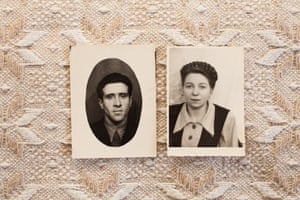'I longed for the moment you would write' -the gulag penpals whose love lasted 60 years. Kasia Delgado
Vladimir was sentenced to 10 years’ hard
labour. Ivanna was Prisoner 108, and his secret correspondent. She looks back
on a love affair with a man she never met
In 1953, a young Ivanna
Maszczak trudged through the Siberian labour camp in which she was serving a
10-year sentence. She was 28 years old, 5ft tall, and hungry. Her shoes were
wet from the snow and the temperature had dropped below minus 50. Ivanna and
some fellow female prisoners were being escorted by guards through the camp to
begin their day of gruelling physical work: mining gold, felling trees and
hacking into the frozen ground.

‘When you talk for so long, so intensely, you start to feel love’:
Vladimir and Ivanna, both pictured in 1955: Lydia Goldblatt/The Guardian
As they stumbled
through the snow, a scrunched-up piece of paper landed at their feet, thrown
from a truck transporting male prisoners. One of them picked it up before a
guard noticed, and later the women huddled together and opened it. It was from
a male prisoner asking whether someone would write to him, to distract him from
the relentless bleakness. Ivanna was deeply moved. Five years into her
imprisonment, she, too, was desperate for human contact. She decided to reply
to this stranger.
Ann O'Loughlin - How the Trans-Siberian railway became the love train
Ivanna, now 93, tells her story in her one-bedroom ex-council flat in London. The flat is on the top floor and there is no lift, but, although Ivanna is very small and thin, she’s strong enough to walk up and down three flights of concrete stairs several times a day. Born in Ukraine, she was taken from her family one frosty January morning in 1948 while her mother, a schoolteacher, made beetroot soup for lunch. She belonged to a Ukrainian youth organisation, and her brother was a member of the Ukrainian underground. “At that time every Ukrainian was under suspicion,” Ivanna recalls. “My father was a priest, which didn’t help, because the authorities were suspicious of priests, members of the intelligentsia, teachers and students.” Even after Nazi Germany’s surrender in May 1945, the civil war in Ukraine and eastern Poland continued, as underground organisations, including the Ukrainian Insurrectionary army, refused to live under communist rule. Ivanna was one of many thousands of ethnic Ukrainians sent to Siberia after being accused of aiding the rebellion.
Military guards
stormed the house and marched the 22-year-old out of her home and into a truck.
“My mother’s eyes were full of tears,” she says, quietly, in her strong
Ukrainian accent. “I told her that I would be back one day. I still can’t
believe I ever came back alive.” .. read more:
